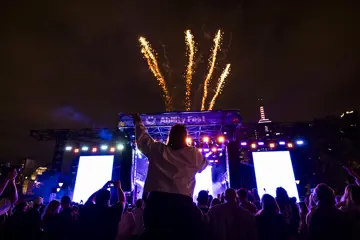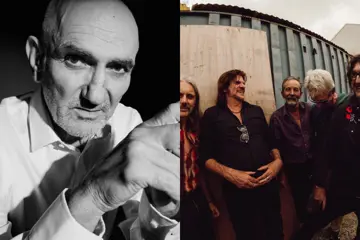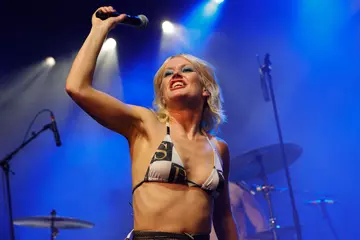There is cabaret and then there's Hot Brown Honey cabaret, which brings together pop, burlesque and hip hop culture. But it is also political — and transgressive.
Today an ebullient Kim Bowers, aka Busty Beatz, is talking up Hot Brown Honey's season at the Sydney Opera House even as she is "freezing in Adelaide". Indeed, Bowers is working on July's local staging of Straight White Men (ironically, her sister Candy handled Melbourne's).
"We've got young First Nations women, we've got women from Indonesian backgrounds, from Samoan backgrounds, African backgrounds..."
Hot Brown Honey has been developed by the Black Honey Company, the production house Bowers launched with Candy, the pair South African Australians. Their mission is to represent greater diversity in Australia's arts and entertainment world. Hot Brown Honey combines music, dance, poetry, rap, comedy, circus and striptease. But, beyond that, it's a celebration of black and brown womanhood. After Sydney, it'll head to Edinburgh Festival Fringe.
"Me, Candy and [co-creator] Lisa Fa'alafi just went, 'We need a platform for our crazy, kooky work that we do — there's no one wanting to put on our stuff at all, so we're just gonna start it,'" Bowers says. "It started quite organically, actually, just picking up guests wherever we went. Then Candy went to do Circus Oz and we decided, 'Let's make a show-show and see what happens!'" Hot Brown Honey stars artists from around the country, both "established" and "emerging". As director, and choreographer, Fa'alafi leads the ensemble of six "honeys". Bowers is musical director but also "host" or "the queen bee". "I'm sort of the mouthpiece." And, here, she gives "a black woman's viewpoint".
In 2016 there is a huge discussion surrounding diversity in the mainstream media that was amplified when Waleed Aly won the Gold Logie Award for Best Personality on Australian Television. But is tangible change occurring in the supposedly liberal arts? "Well, I mean, there's this discussion -- there's talking the talk and then there's walking the walk. And there's a lot of levels of that walking the walk. There's kind of that idea that, if we just put different people in these roles that it will be a change, right? And, yes, it will. But what we're after is an overall change — looking at the structure and going, 'Actually, what needs to be happening here is the stories need to be told, the writing needs to be done...' Who's behind the camera is just as important as who's in front of the camera. So it's hard. I haven't seen enough of a change."
Don't miss a beat with our FREE daily newsletter
Bowers feels that a cabaret production can recontextualise the discourse for those who may not be listening. "It's a trick, is what we like to say. We say, 'Oh, look at this cabaret! Look at this thing.' What it is is a political theatre piece. [But] people don't wanna go out and see a political theatre piece (laughs), so we've used some of those devices to go, 'Oh, mate, come on in...'" Even performing at the Sydney Opera House is symbolic. "Going into these institutions and these spaces is really great — our audiences reflect us. It's like that quote, 'You cannot be what you cannot see.' We've got young First Nations women, we've got women from Indonesian backgrounds, from Samoan backgrounds, African backgrounds, so, of course, our communities are there to support, which is just so awesome."















